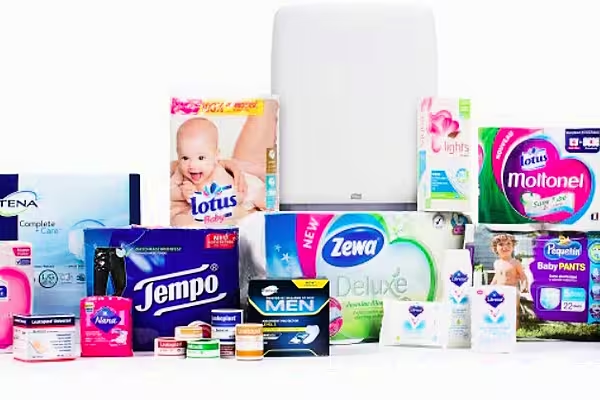Paper products giant Essity has reported an 8.6% increase in net sales in the first half of its financial year, however a leading industry analyst says that higher raw material costs are likely to weigh on the group going forward.
Adjusted EBITDA was up 7% to SEK 6.92 billion (€660 million), while adjusted EBITDA margin was 11.0% in the period.
The group's biggest segment, Consumer Tissue, saw a 10% increase in net sales to SEK 24.4 billion (€2.32 billion) in the first half, while its Personal Care business was up 7% to SEK 23.7 billion (€2.25 billion).
Its Professional Hygiene business saw net sales up 9% to SEK 14.6 billion (€1.39 billion) in the half.
In its second quarter, the group said that investments in sales and marketing, primarily in its Asia and Latin America, contributed to higher growth, as did the launch of new products.
The group's net sales increased 7.9% in the second quarter, compared to the same period last year, while organic sales were up 3.9%.
'Efficiency efforts are according to plan and we have achieved significant cost savings,' the group said in a statement. 'Our raw material and energy costs were higher during the quarter, although the market prices for such items as pulp are demonstrating a declining trend, albeit from a high level.'
Analyst Viewpoint
Commenting on Essity's performance, analysts Liberum Capital noted that second quarter organic sales growth fell marginally below expectations (4.0%), while higher raw material and energy prices had an 80 basis point negative impact on group margin, despite the group's efforts to increase unit prices.
'While Essity offers significant self-help and long-term growth opportunities, higher raw material costs are currently weighing on the group,' Liberum said in a statement. 'We acknowledge that Essity is taking prudent action to recover high input cost inflation through a mix of further price rises and cost efficiencies. However, even with stable pulp prices, the mismatch between cost pressures and pricing and cost savings will hold back earnings progression in 2019.'
Liberum also suggested that Essity may see pressure on volumes due to price rises, the exit from mother reels and restructuring. 'The exit from mother reels and plant restructuring will hurts plant efficiencies in the near term,' it said.
Essity said that it is taking further steps to cut costs, and expects to achieve around SEK 900 million in savings by the end of 2019.
In May, the group announced the divestment of its 50% stake in the partly-owned SCA Yildiz business in Turkey.
Liberum anticipates the group to report 3% organic group sales growth on average between 2019 and 2023.
© 2019 European Supermarket Magazine – your source for the latest retail news. Article by Stephen Wynne-Jones. Click subscribe to sign up to ESM: European Supermarket Magazine.














